The last few days have been about ‘How awesome is Mojeek?’ and ‘How shit is Bing?’
I’m finding great search results from Mojeek, and as a site search for Lucire, it’s absolutely brilliant. Blows Duck Duck Go (Bing with privacy) away, even back when DDG had a reasonably comprehensive index of our pages (before the HTTPS switch). I don’t have to subject anyone to Google tracking, and I didn’t have the hassle of installing an internal search ourselves.
Cisene, who I met via Mastodon, very helpfully suggested on that social network that I submit site maps for the Lucire website as that would take a reasonably short time to remedy Bing’s ills. I’ve never had to do them for Google or Mojeek: their spiders work as they have always done since the dawn of search engines. For some reason, Bing needs its hand held if I want it to have thousands of pages again, as it did earlier this year.
One thing I found curious with Bing is its insistence, in a site search, to place a page that we have not linked to since 2005 at the very top. Of course I could delete the page or program in a forwarder, or make a 301, but I was also once told that dead links and forwarders were bad things for search engines. Our ‘About’ page also ranks highly in all search engines, despite not being linked to in anything we’ve done in over 15 years as well.
But where’s the home page? Happily, after submitting site maps, Bing’s index of our pages went from 10 to a whopping 55, and the home page appeared for the first time in a site:lucire.com search:
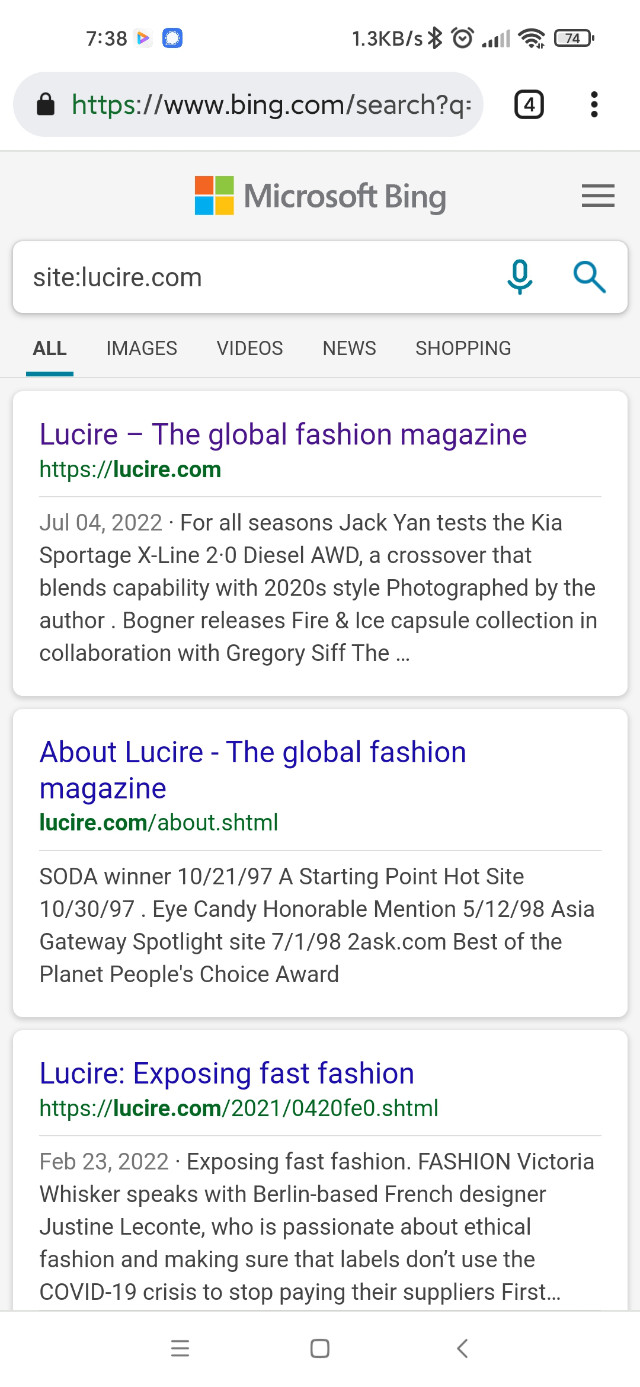
‘It’s an improvement,’ I thought, though the search engine is still massively handicapped compared to where it was at the start of 2022.
Checking on Bing Webmaster Tools to see where things were, I was curious to see it claim that it could not crawl or index our home page though it was discovered in 2018:
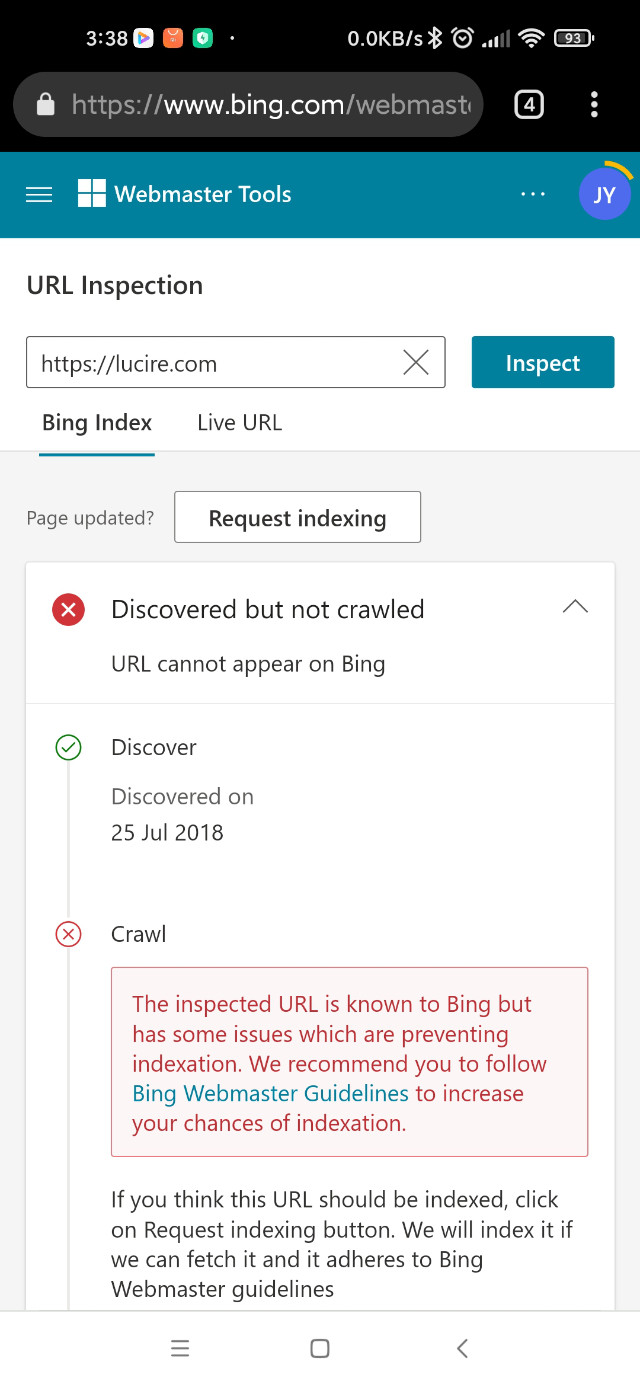
But you just crawled and indexed it. Which is it?
The excuses this time (as Big Tech people love to make stuff that blames users) are that there are no <H1> tags (I’ve got news for you, Bing: we don’t use them, and why should we? There was never any rule that stated that headlines must be between them, and no one else seems to care) and that the description is too long (again, it was fine for you before—and actually you’ve just shown that it is fine).
They aren’t in the business of search though, as their explanations reveal. It’s seach:
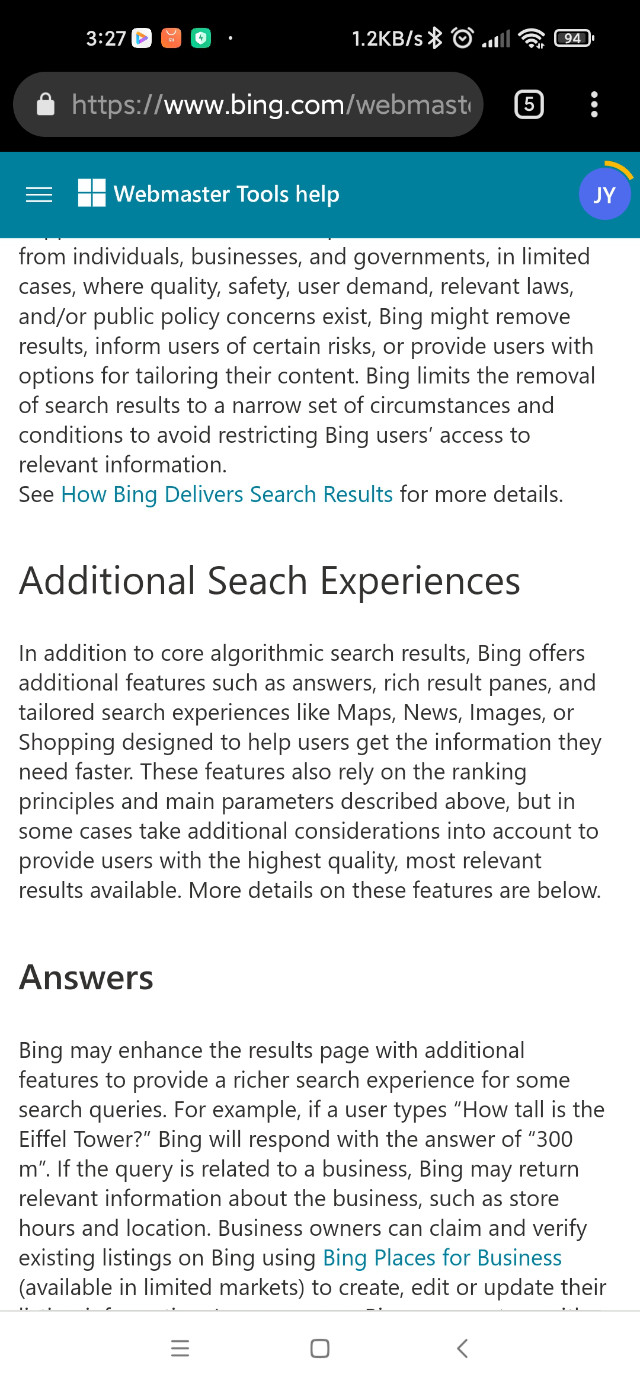
Goodness knows how many years that’s been there, ignored.
It’s all so slap-dash and unprofessional, and as Duck Duck Go search results are based on Bing’s, I’m going to have to stop recommending it. Fortunately, I found Mojeek at the perfect time.
I’m also discovering that maybe Bing can no longer handle more than 50-odd pages per site anyway, which, of course, makes it useless as an engine that powers a site search. (Like I keep saying, the defunct Excite in the 1990s could do better. Any search engine from those days could spider and index more effectively.) It would be in line with other Microsoft products, such as Notepad, where the software giant now prevents us from typing £ or €, except, presumably, people from the countries where those are the common, keyboard-accessible currency symbols. Want to write Cæsar drinks Nescafé? You can try, but the diphthong and é will be missing.
Today I searched site:autocade.net on Bing. Now, we never switched Autocade to HTTPS. After how all our sites fell, would you risk it? This site is dependent on search-engine traffic.
And here are the number of pages each search engine brings up for a site search.
Google: 4,080
Mojeek: 3,348
Bing: 51
Duck Duck Go: 50
Brave: 17 (plus 4 underneath first entry)
So I can’t keep blaming the switch to HTTPS, though our troubles with all search engines I knew of then began around this time. Autocade still slipped in Bing despite no down time; we went to a newer Mediawiki version, but that was about it. Everything progressed as it always did.
Google eventually allowed things to recover (for the most part) with the exception of our company website (which rose up to 13th before dropping to 26th today), Mojeek never even had an issue to begin with, but Bing and Duck Duck Go don’t link to Jack Yan & Associates’ website till after the 40th position.
So where are we now with the sites I last looked at?
Number of results for site:lucire.com
Google: 6,250
Mojeek: 3,563
Bing: 53
Duck Duck Go: 53
Brave: 15 (plus 4 underneath first entry)
Number of results for site:jackyan.com
Google: 1,860
Mojeek: 438
Duck Duck Go: 54
Bing: 43
Brave: 13 (plus 4 underneath first entry)
Number of results for site:jyanet.com
Google: 743
Mojeek: 296
Bing: 49
Duck Duck Go: 49
Brave: 20
I honestly think Bing is broken.
Just as well no one I know uses it, but quite a number of people do opt for Duck Duck Go, because of the work it’s done in promoting privacy. I still admire them for this stance. But as many of you know, it sources its results from Bing, so if one is broken, both will be. And that’s a darned shame as I almost hit 12 years of having Duck Duck Go as my default (from August 2010 or thereabouts).
All the more reason to retain Mojeek as my default search engine.
Will I bother looking any more into Bing? Probably not, but how do I convince all those I recommended Duck Duck Go to to check out Mojeek?
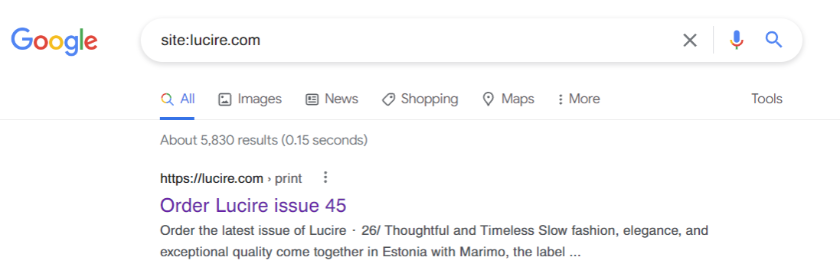
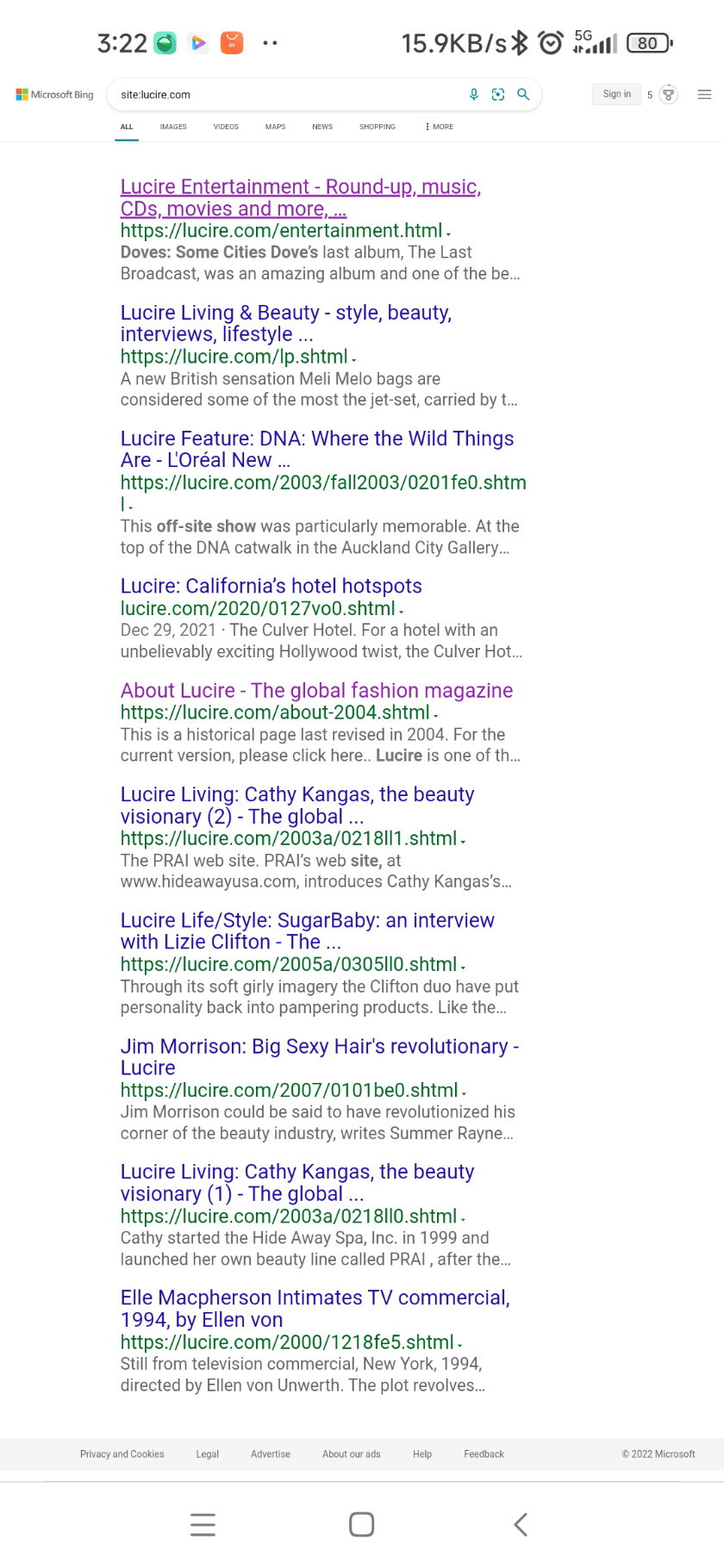

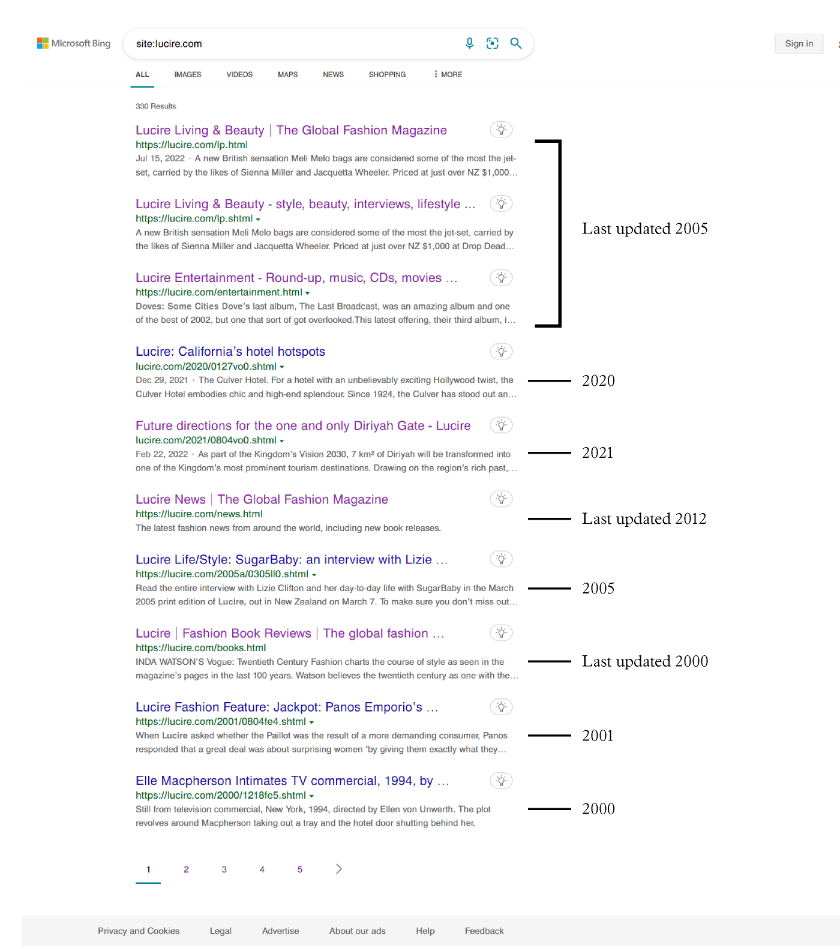
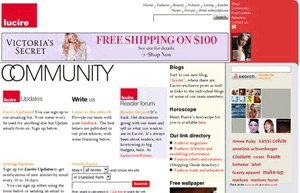
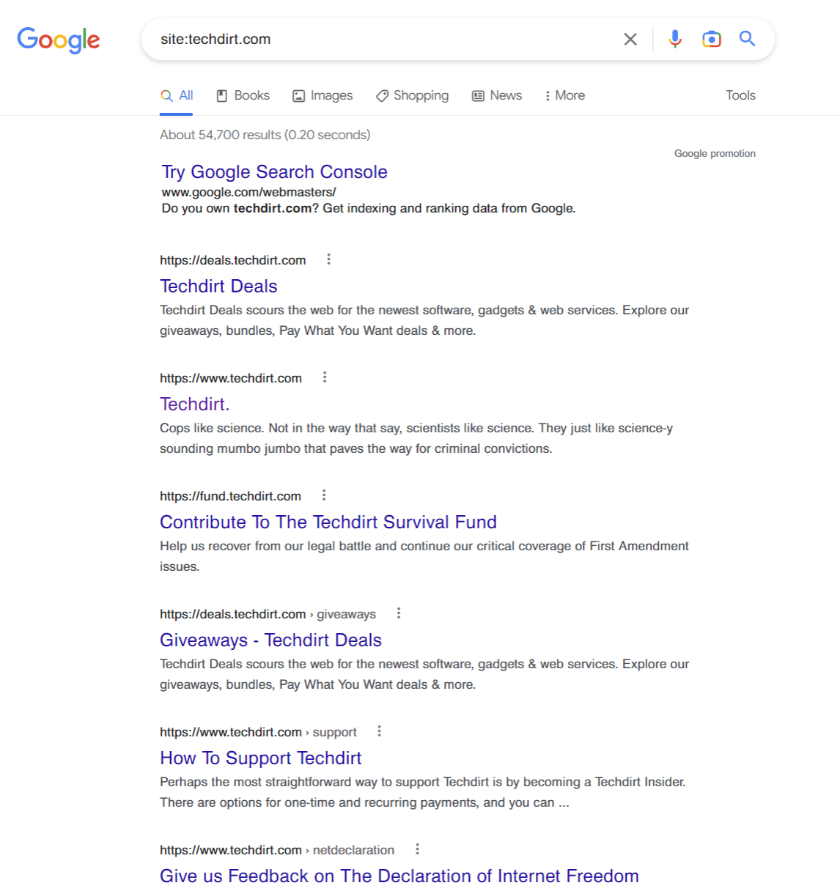
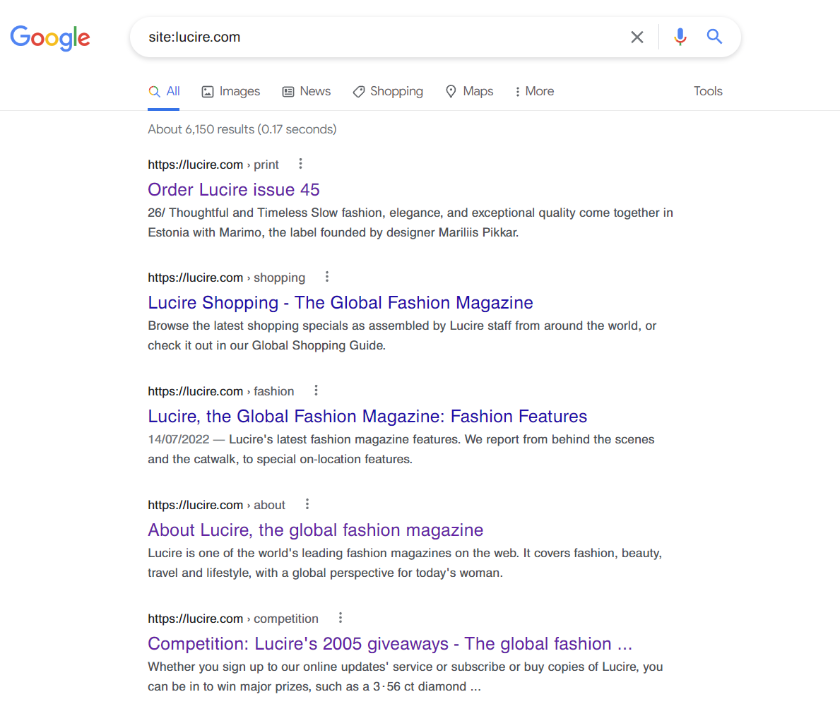
On your recommendation, I tried Mojeek (which I’d never heard of) on my own name, and it might just as well have been the Wayback Machine. The top results were from 2012, 2013… not the most recent stuff, by any means.
DuckDuckGo’s top results are (mostly) recent and relevant.
Bing has a few issues, but is mostly fine…
Google has the best links first, hands down. But then you might double-check for me, because I am logged into both Bing and Google.
Ecosia – so so (better than Mojeek, but I wish the first three results on page 2 were moved up to page 1, and the blogspot link should’ve fallen out by now!)
Qwant – great results, if you can ignore all the stupid ads for public people finder data. Ugh. But the results themselves are good – recent, relevant, authoritative (at least through page 2)
Swisscows – similar results to Qwant (including the peoplefinder ads) but searches earn points and points go to charity.
searchencrypt – about average
startpage – excellent!
searx – waste of time
yandex – above average, but who ARE these women in the images?? wish I looked that good in a swimsuit!
virtualmirage – above average
Disconnect search engine – about this time, I realize most of these are just aggregating results from Bing, Google, DuckDuckGo, Yahoo, etc. and preventing you from being tracked by the actual search engines. But this one does seem to take privacy and disclosure seriously. Average to above average results.
OneSearch (owned by Verizon, I think) – decent results, wish it ranked my own site higher than some of my social media platforms, but meh – at least it puts my Amazon page at the top! ;)
Google is best at search, just that it has its privacy issues. For your name (in quotes), I get Amazon, your site, your site’s about page, Instagram, Linkedin, Facebook public page, Facebook personal page, Reedsy, Quora.
Bing: Amazon, Goodreads, Medium, Linkedin, 4RV Publishing, Official USA, Twitter, YouTube, Blogspot, Substack. Your jahangiri.us site does not show up in the first five results’ pages at all. I hate to say it, but as its index propagates, it will affect all other Bing-powered search engines, as it did for us. (Bing is Wayback Machine for Lucire. Most of what it has retained dates from the early 2000s.)
DDG: Amazon, your site’s about page, Goodreads, 4RV Publishing, Linkedin, YouTube, your site, Twitter, Facebook personal page, Blogspot.
Mojeek: your 2013 directory, Career Mom, Marian Allen, I’m Just Sharing, Amazon, Silver Sparks, I Blog Zone, Social Media Sun, Famous Bloggers, The Book Marketing Network.
That’s the thing with Mojeek though: it delivers relevance over novelty, and it seems to work as an old-fashioned search engine did. You’ll remember they all used to grandfather older sites and pages. For a Lucire internal search, I see the same pattern if I don’t specify a specific topic. But once you have a search term, it’s really good. The index is only a few days older than Google’s (for Lucire), and so far it’s come up with pretty decent results.
I’m really enjoying it as you can take a stab at why some older pages are ranked highly (e.g. inbound links, and possibly the authority that comes with having survived online for so long?). And remember it’s largely the work of one person on a shoestring. Funding came from friends to the tune of equipment and, later, £50,000, before a publishing company injected a couple of million pounds into it in 2019. To do so well against the thousands of millions that Google has impresses me.
For me: Ecosia, Qwant, Onesearch and Swisscows are Bing, so they suffer from the same exclusions (thousands of pages lost by Bing, now reflected in them all). Startpage is Google.
For example, Ecosia: Amazon, Goodreads, Medium, Linkedin, 4RV Publishing, YouTube, Twitter, Marian Allen, Facebook personal page, Blogspot. Like Bing, your personal site is nowhere to be seen in the first five pages.
Qwant: Amazon, Goodreads, 4RV Publishing, Linkedin, YouTube, Twitter, Facebook personal page, Blogspot, Substack, Mylife for Jahangir Jahangiri of Houston. Your site does, however, come up 11th and 13th.